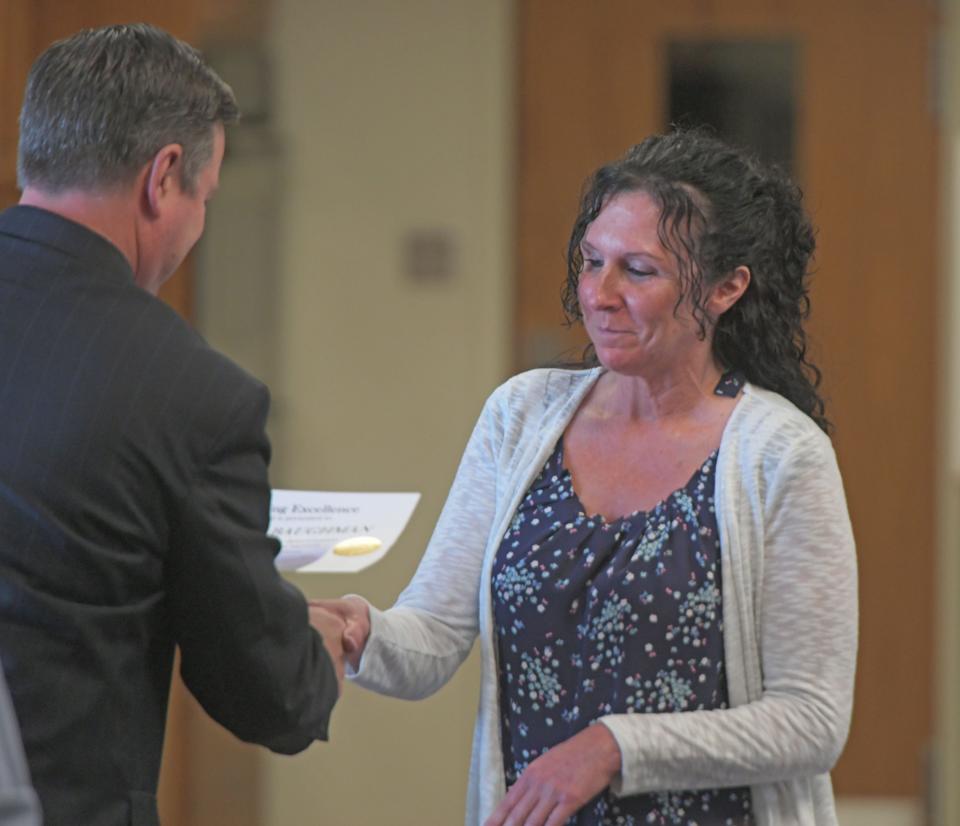Richland County Drug Court recognizes 17 graduates of program
If not for Richland County Drug Court, Heather Baughman says she would have taken her own life.
"It was that bad," she said. "My mental state had deteriorated from drugs and the life I was living."
Baughman was among 17 drug court graduates from an unusually large class recognized Thursday at the Life Celebration Reception Center.
Before going to drug court, Baughman was using methamphetamine and alcohol, often with her husband. They were homeless and sometimes stayed in the basement of his grandmother's house.
She described her life as "very chaotic."

Baughman said she has been sober for 14 months. She now lives out of county after deciding to stay in the city where she received treatment.
"I changed everything, people, places, things," she said. "I decided to leave everything behind."
Retired Common Pleas Judge James Henson, who was in attendance Thursday, started drug court in 1997. It was one of the first five in the state.
Judges Brent Robinson and Phil Naumoff continue the tradition today.
"At the time, people weren't really sure about it," Robinson said.
As an assistant prosecutor in Richland County at the time, he was one of the skeptics, fearing the county was going soft on crime.
He has since come around.
"It's a collaboration," Robinson said. "Everybody works together for a common goal, sobriety."
Success through supervision: Drug Court numbers show positive results in more than one way
Drug courts provided treatment, accountability
Drug courts are designed to keep nonviolent drug-addicted individuals in treatment for long periods of time with close supervision. They seek to strike a balance between treatment and accountability and have proven to reduce recividism.
Brandon Thull is one of Richland County's success stories. He graduated from drug court in 2019 and returned Thursday as the guest speaker.
2023: 10 people earn recognition for completing Richland County Drug Court
Thull has been sober for more than six years.
"Drug court is one of the best things I ever did," he said. "Addiction, the homelessness, that was me."
Thull said he had no job and was about to lose his children. He now is married and has a home with five children.
"The reason I'm standing here today is not ending my journey when I graduated from drug court," Thull said. "My advice to everybody is to continue on that journey."
Ashley Morrell plans to do just that. She was another of Thursday's graduates.
"I caught a theft charge," Morrell said of how she wound up in drug court. "I went to my court hearing. They said they were denying me the diversion program, and they were going to put me in drug court because of my misdemeanor background."
She has been sober for a little over a year and gave up heroin nearly four years ago.
"Drug court made a difference," Morrell said. "I've been working since I came home from jail. I've been clean, and I've got my girls."
She also has a driver's license and a place of her own.
Jason Hoover is the coordinator of the local drug court, helped by probation officer Lindsey Hobbs. J.J. Bittinger is the project director.
"All of us care about the outcome," Naumoff said. "The most important cog is the participant. They have to be able to want to get clean."
He urged the graduates to continue on the same path.
"Your life will be better, I promise you," Naumoff said. "A sober life is one worth living."
More: Drug overdoses spiked in these states. But they have dropped elsewhere in the country.
mcaudill@gannett.com
419-521-7219
X: @MarkCau32059251
This article originally appeared on Mansfield News Journal: Richland County Drug Court recognizes 17 in graduating class

